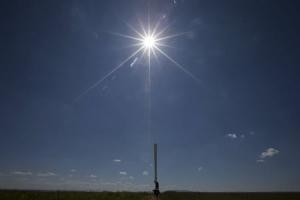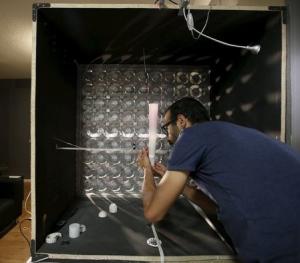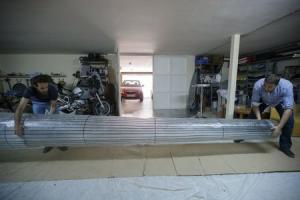Thanks to our Boston-based co-host, Jack Gregg, for this excellent piece.
By Jose Elías Rodríguez
(Reuters) - A 1940 clip of the Tacoma Narrows suspension bridge in the United States stretching like chewing gum in a gale captured the imagination of a Spanish engineering student who became obsessed with how he could turn that chaos into power.
Twelve years later, David Yanez is part of a team inspired by the motion that collapsed the bridge to create a bladeless wind turbine - an inverted-cone-shaped structure half the cost of a conventional machine.
"You could see a structure with no gears or bearings capable of absorbing large quantities of wind energy," David Yanez recalls of the footage of the bridge. He was standing on a hill in central Spain in front of a slim, gently oscillating prototype, the size of a small tree.
His company, Vortex Bladeless, is a rare bright spot in a Spanish renewable energy industry badly damaged by loss of investor faith after Spain rowed back on subsidy promises at the height of the eurozone debt crisis.
After the company invested around 1 million euros ($1.1 million) in public and private start-up funds, it is close to receiving an injection of $5 million from a U.S. investment fund, said Raul Martin, Yanez's university colleague and partner in Vortex Bladeless.
"We hope to announce a deal with a U.S. investor with Asian roots fairly soon," he said, adding that a crowd-funding campaign to raise at least $50,000 was mainly aimed at increasing visibility of the project.
The patented design works by spinning air whirlpools in the inverted cones to create patterns of oscillation that are converted into electrical power by a generator.
The same phenomenon is responsible for the "singing" of high-tension electrical wires in the wind.
"We've all seen how a soprano can shatter a glass with the pitch of her voice," said Yanez. "Instead of using sound waves, we use the swirls generated in the structure by the wind."
They claim producing energy with a Vortex is 40 per cent cheaper than with a conventional windmill as it costs much less to build and maintain. That cost advantage should make up for a structure that captures less wind and is not quite as efficient as a conventional three-blade windmill.
The structure is also much safer for birds as it does away with the revolving blades of conventional models which are estimated to kill hundreds of thousands of birds every year.
WIND OF CHANGE
Vortex's success will depend on whittling down the cost relative to the power coefficient - a measure of how much energy can be converted into electricity, said Ignacio Cruz, wind energy expert at research body Ciemat.
"If the power coefficient is low, it has to be really cost competitive," he said. The Vortex team is fine-tuning the prototype to maximize cost-effectiveness by experimenting with different materials.
Though the company's ultimate aim is the big wind energy market with turbines of 100 meters (109 yards) tall or more, the first stages of the project have a clear focus on small installations for domestic or small-scale industrial use.
Vortex plans to have a three-meter high, 100 watt commercial prototype by the end of the year which could be installed on the ground or on roofs, costing around 300 euros apiece to produce.
"With two or three Vortex and four or five solar panels, by investing 2,000 to 3,000 euros you could generate enough power for your home," says Yanez, who also thinks the machine could transform the energy industry in countries like India where the grid falls short for much of the population.
The future of the bladeless windmill is aligned to development of energy storing batteries, such as the ones developed by U.S. electric car maker Tesla, Yanez said.
The ability to store energy generated by wind and sun would make renewable energy more efficient and would allow people in developing countries to have an independent power source.
"A good battery and generation system could encourage people to secure their own power supply and go off-grid," says energy expert Cruz.
(Editing by Sonya Dowsett and Peter Graff)




No comments:
Post a Comment